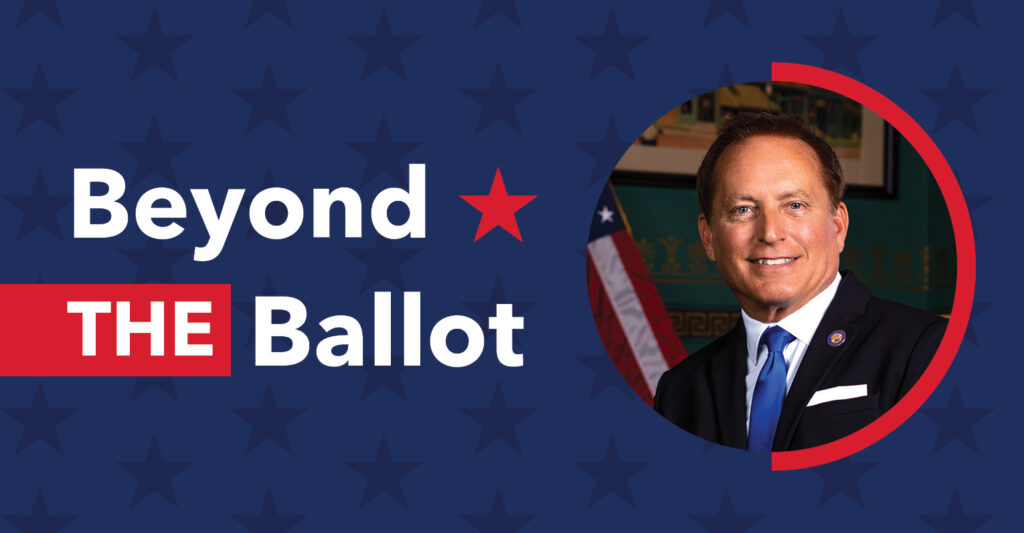
By Lexington Souers, Communications Associate
Raised in a family focused on giving back, and pulling from a successful career in business, Iowa Secretary of State Paul Pate recognized the power of government action.
At age 29, Pate became the youngest member of the Iowa Senate and embarked on a path toward his current role. Following the conclusion of his first of two spells as secretary of state in 1998, Pate continued his service to Iowans as mayor of Cedar Rapids and president of Iowa’s League of Cities. He also served at the national level with the U.S. Conference of Mayors, with a specific focus on housing.
“I was raised in a family where my folks really underscored public service and giving back,” Pate said. “If you’re going to be fortunate enough to do well in life, you need to give back. We live in great communities and great states, but not everybody has the same successes, and you want to try to bring some of that back to them.”
Throughout Pate’s tenure in each role, he saw the impact that he and his staff were making. Similar to his broad reach as secretary of state, his role as president of Iowa’s League of Cities allowed him to be a difference maker for the residents, he represented in more than 900 Iowa cities.
“That was an eye opener,” Pate said. “You’re talking about towns as small as a couple of 100 people compared to our larger cities, and trying to balance out how we help all those communities have the resources and knowledge they need to be competitive.”
Nearly eight years ago, Pate returned to the Iowa Office of the Secretary of State. This time, he entered with increased attention on elections due to rapid changes in technology. According to Pate, he needed “jumpstart” those effort in the office, especially given the rise of social media and voting by mail.
Pate stressed the need for a trusted source for elections, whether it through his office or the local elections commissioner.
“The big concern I had then, and I have today even more so, is if the public loses confidence in the integrity of our election for whatever reason — whether it’s foreign interference or even local — then our republic has fallen,” Pate said. “And they wouldn’t have done it without firing a single shot. That’s alarming to me.”
Pate promotes a “trusted source” approach, which includes voter I.D. laws, random audits of elections and public pretesting of tabulators. While he said there are still hurdles, being transparent has led to increased trust and support by the public.
Increasing overseas voting and the role of military voters was also an important goal for Pate, who promoted a 120-day extension for certain service members. He added auditing occurs for military members requesting absentee ballots, accounting for how military service has changed. Included among these members are an influx of reservists and guardsmen who have been posted overseas.
“They are voters. They have a lot of involvement and commitment to their local communities because they know the candidates in their town,” Pate said. “They still want to stay in touch with that. We work hard with the local command and make sure those folks have what they need. I’m not going to just count on somebody handling it from the military or the Department of Defense. I want to do what we can on the local level to give them that information.”
Iowa Safe at Home is another program endorsed by Pate, offering address confidentiality for victims of domestic violence and other crimes. Through the program, victims can register their addresses with the Office of the Secretary of State, protecting what would otherwise be public information from potential bad actors.
“I can report now that we’re seeing a significant uptick of folks who are survivors of very unfortunate situations that have come out of the dark to rejoin their communities and are stepping up and voting again,” Pate said. “I think Safe at Home is a big part of that.”
Iowa has one of the highest voter turnouts in the country, which Pate attributes to Iowa’s community and length of life as well as a civically minded culture. Pate said he supports a curriculum for students to understand the importance of Iowa’s caucus system. Students, in turn, help educate their parents. Teachers can also use an Elections 101 curriculum to provide modules showing the importance of elections.
Before the formal election, youth from across the state participate in a youth straw poll. The Office of the Secretary of State provides a digital copy of the official ballot or students can vote using an online poll. Results are reported in real time.
“I find the straw poll very intriguing because we do it ahead of the adult election and these young people across the state are pretty darn close to being on the mark of what the results will be,” Pate said. “When we dug a little deeper, we found out you can attribute it to — believe it or not — people still talk over the dinner table. This shows me that the parents and kids are talking about it.”
Education outside of the classroom became a key component of Pate’s role as secretary of state, especially given the rise in misinformation. Pate said it is not his role to censor free speech, but instead ensure Iowans know when and where to vote, among other key points. This is done through voter ready websites and online voter registration, as well as partnering with organizations like the NAACP and the NRA to promote voter toolkits.
“I believe myself and my colleagues are the referees,” Pate said. “We administer the laws of the land and make sure we offer as much transparency as we can. That consistency and transparency is what the voters need and expect to have confidence in the elections process. The more I, and my peers, can make sure that is out there, upfront on a regular basis, the more successful we will be on both encouraging people to vote and believing in the results.”
Pate and his office partner with numerous federal organizations to monitor the security of Iowa’s elections at every level. The FBI, CIA and even white hat hackers are among them. Local offices are often smaller and are handling more than just elections, according to Pate. As a result, the statewide office may need to handle trainings, recruiting poll workers or security measures.
“I’ve been able to push out that security to our local level because you’re only as good as your weakest point,” Pate said. “With 99 jurisdictions out there, we wanted to make sure they had the same kind of protection. We have endpoint protection for them, which means 24 hours a day we’re monitoring their systems for outside intrusions so no one can manipulate our voter databases.”

